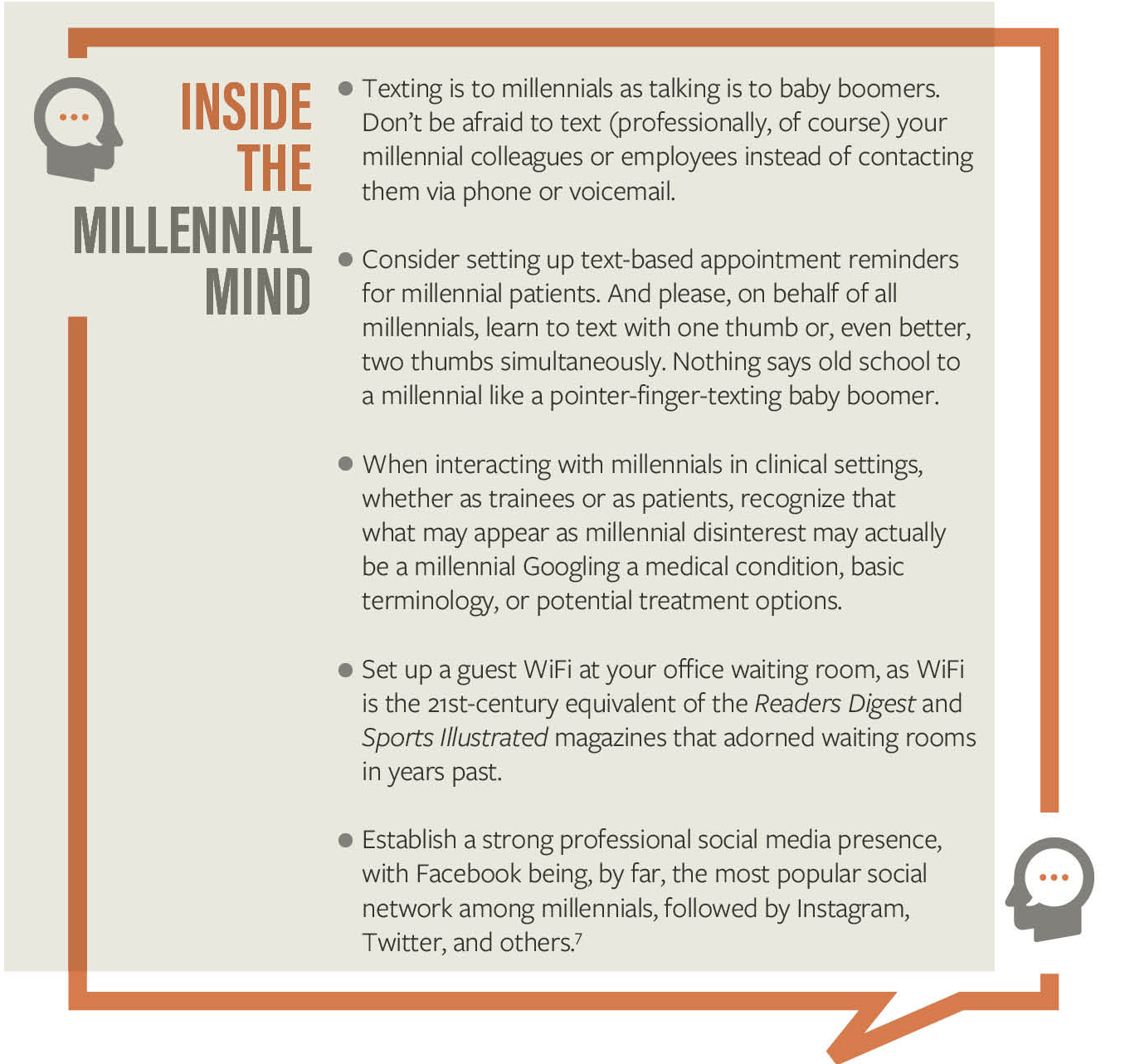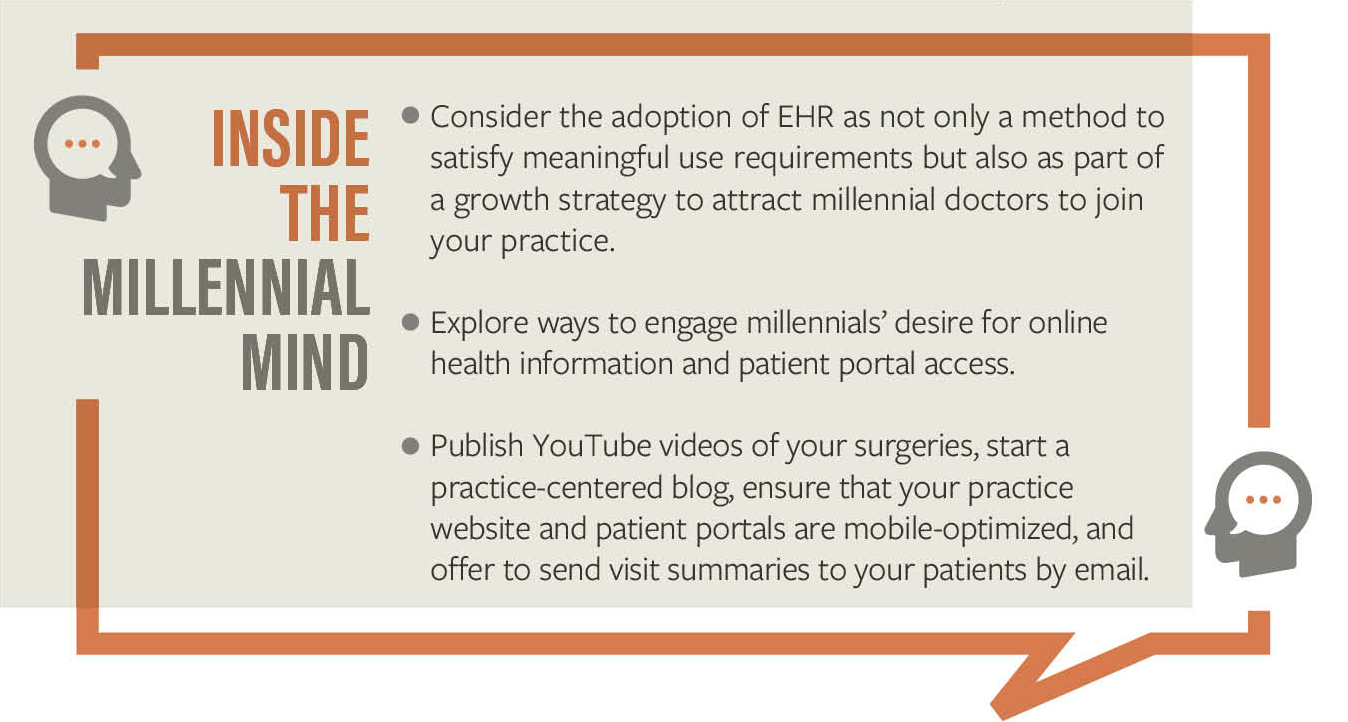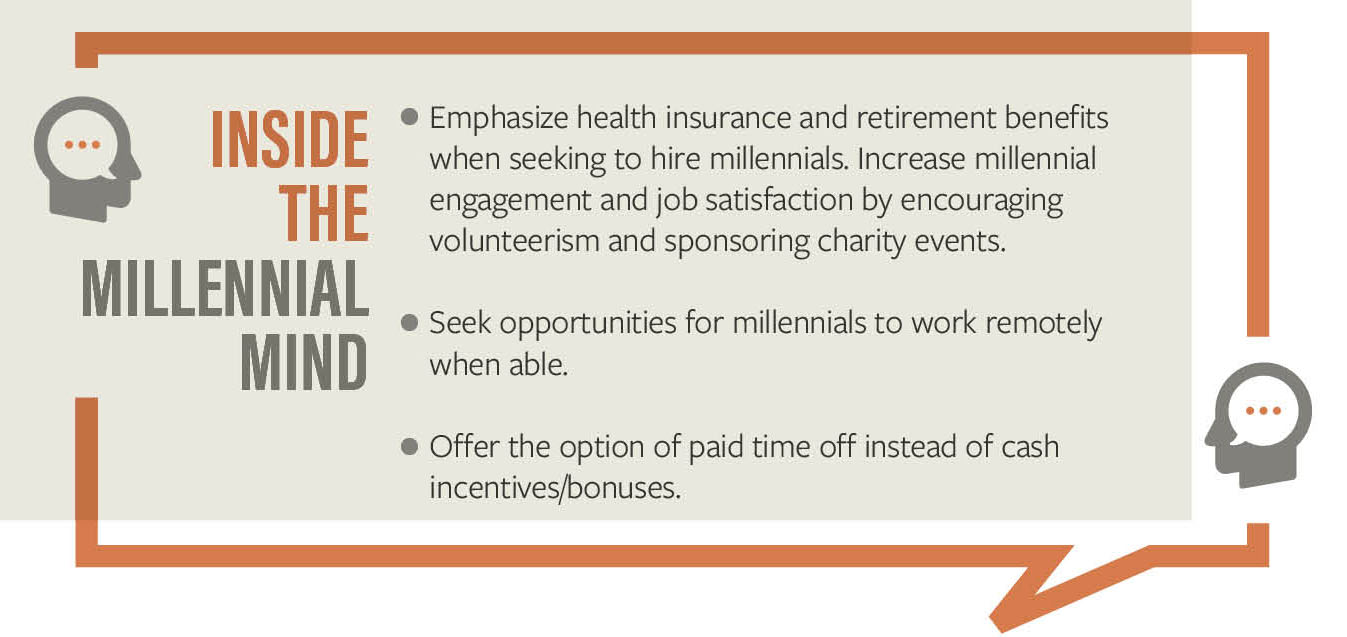Self-entitled, self-absorbed, and selfie-obsessed. These are just a few adjectives critics use to describe the millennial generation of today’s 16- to 36-year-olds, born between 1980 and 2000. Born in the early 80s, I both understand the criticism levied against my generation and simultaneously empathize with many of my peers who were raised in the digital revolution and, thus, see the world differently digitally. The unique and at times bewildering views of millennials pose challenges to the health care industry and to the US workforce, which, as of 2015, is now primarily composed of millennials.1
So, who are today’s millennials, and how can mid- and late-career physicians engage millennial employees, attract millennial patients, and impress potential millennial partners? Before we go inside the millennial mind, let’s seek first to understand the research about millennials—their technology, their potential impact on electronic health records (EHR), and their values.
SMARTPHONES
More than 85% of millennials own a smartphone,2 and 18- to 29-year-olds send or receive, on average, 88 text messages daily3 compared with 27 daily text messages for those aged 30 to 49 and 11 for those aged 50 to 64. Furthermore, text messaging is a vital tool to reach millennials, as 98% of text messages are opened4 compared with just 23% of emails.5 Smartphones are now a mainstay for millennial learners, with 59% of Canadian medical students and 77% of residents reporting smartphone use more than once a day to access medical resources online, with the most popular being UpToDate, Epocrates, and Medscape.6

EHR AND PATIENT PORTALS
Today’s millennial physicians were raised in the digital age of computers, learning to both type and write cursive, a skill that is no longer even included in common core curricula. Most millennial physicians today have NEVER written a patient progress note by hand, and, despite their predecessors reminiscing about “the good old days” of paper charts, many millennials would still prefer to type their notes. While still too early to tell, it seems fair to speculate that millennial physicians may hasten the adoption of EHR, as many young physicians (myself included) specifically seek training programs and practice settings with an established EHR. Millennial patients may also further adoption of patient portals, as 43% of millennials want to be able to access patient portals using their smartphones, 44% would like to use portals to obtain personalized health-related recommendations, and 23% would like industry news about health topics of interest to them.8 Finally, more than 70% of millennials would like their physician to use mobile devices to review health records and schedule appointments.9

QUALITIES, VALUES, AND LIFE PRIORITIES
Perhaps the most interesting social research among millennials involves their qualities, values, and life priorities. Despite being publicly criticized as self-centered and entitled, millennials do NOT rank salary as the highest factor when seeking employment, and they are, in fact, willing to forego a higher-paying job for benefits such as health and life insurance.10 Millennials have high rates of volunteerism11 and financial donation,12 believe families have a responsibility to care for elderly parents,13 greatly value paid parental leave and relocation to be near family,14 and are more optimistic about the future than any prior generation.15

SUMMARY
Millennials, like every generation, are characterized by well-defined, and often misunderstood, stereotypes. By appreciating what is inside the millennial mind, the background, the skillset, and the unique views of this digitally driven generation, we can better engage millennials to make a positive difference in the workplace and the world.
1. Fry R. Millennials surpass Gen Xers as the largest generation in U.S. labor force. Pew Research Center. May 11, 2015. https://www.pewresearch.org/fact-tank/2015/05/11/millennials-surpass-gen-xers-as-the-largest-generation-in-u-s-labor-force/. Accessed April 10, 2016.
2. Mobile millennials: over 85% of Generation Y owns smartphones. Nielsen. September 5, 2014. https://www.nielsen.com/us/en/insights/news/2014/mobile-millennials-over-85-percent-of-generation-y-owns-smartphones.html. Accessed April 10, 2016.
3. Smith A. How Americans use text messaging. Pew Research Center. September 19, 2011. https://www.pewinternet.org/2011/09/19/how-americans-use-text-messaging/. Accessed April 10, 2016.
4. Big data: profiling your mobile customers. https://info.dynmark.com/hs-fs/hub/307137/file-650880813-pdf/whitepapers/Intelligence_Review_Edition2.pdf. Accessed April 10, 2016.
5. Email communications strategy. Smart Insights. https://www.smartinsights.com/email-marketing/email-communications-strategy/. Accessed April 10, 2016.
6. Boruff JT, Storie D. Mobile devices in medicine: a survey of how medical students, residents, and faculty use smartphones and other mobile devices to find information. J Med Libr Assoc. 2014;102(1):22-30.
7. How Millennials use and control social media. American Press Institute. March 16, 2015. https://www.americanpressinstitute.org/publications/reports/survey-research/millennials-social-media/. Accessed April 12, 2016.
8. Annual Xerox EHR survey: Americans open to viewing test results, handling healthcare online. Xerox. https://news.xerox.com/news/Xerox-EHR-survey-finds-Americans-open-to-online-records. Accessed April 12, 2016.
9. How digital do millennials want their doctors? eMarketer. February 24, 2015. https://www.emarketer.com/Article/How-Digital-Do-Millennials-Want-Their-Doctors/1012095. Accessed April 17, 2016.
10. The truth about millennial workers. Capstrat. https://www.capstrat.com/elements/downloads/files/millennials-work.pdf. Accessed April 17, 2016.
11. Fromm J. The key to getting millennials to donate: create something they can experience. Forbes. November 11, 2015. https://www.forbes.com/sites/jefffromm/2015/11/11/the-key-to-getting-millennials-to-donate-create-something-they-can-experience/#41d8f381e235. Accessed April 15, 2016.
12. Schulte B. Millennials are actually more generous than anybody realizes. The Washington Post. June 24, 2015. https://www.washingtonpost.com/news/wonk/wp/2015/06/24/millennials-are-actually-more-generous-than-anybody-realizes/. Accessed April 15, 2016.
13. Millennials: confident, connected, open to change. Pew Research Center. February 24, 2010. https://www.pewsocialtrends.org/2010/02/24/millennials-confident-connected-open-to-change/. Accessed April 17, 2016.
14. Global generations: a global study on work-life challenges across generations. EY. https://www.ey.com/Publication/vwLUAssets/EY-global-generations-a-global-study-on-work-life-challenges-across-generations/$FILE/EY-global-generations-a-global-study-on-work-life-challenges-across-generations.pdf. Accessed April 17, 2016.
15. Millennials in adulthood. Pew Research Center. March 7, 2014. https://www.pewsocialtrends.org/2014/03/07/millennials-in-adulthood/. Accessed April 17, 2016.

